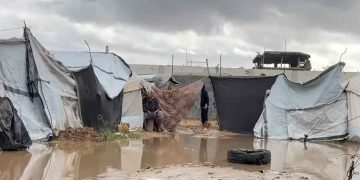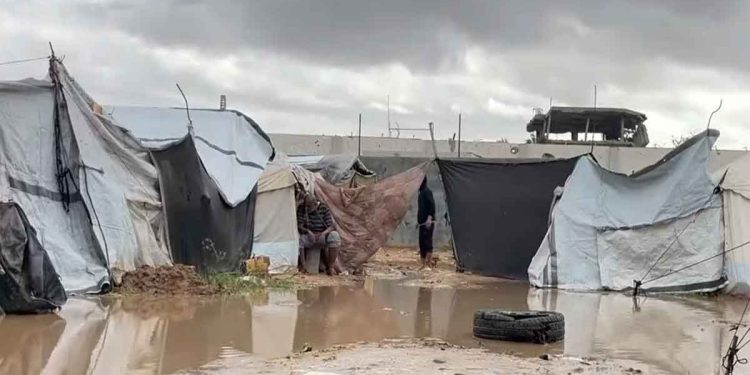The Gaza Strip is facing a new chapter of humanitarian tragedy after a powerful storm hit the area on Tuesday evening, causing widespread damage that severely affected the lives of hundreds of thousands of displaced civilians.
According to the Government Media Office, more than 22,000 tents were directly damaged, leaving around 288,000 families exposed to the cold and rain, as the temporary infrastructure within the displacement camps was destroyed.
Ismail Al-Thawabta, the office’s director, stated in press comments that losses are estimated at around $3.5 million due to the flooding of large areas and the disruption of temporary sewage and water networks. More than ten mobile medical units were rendered out of service, essential medicines and supplies were lost, and large quantities of food and aid were spoiled.
He added that the storm also destroyed alternative energy systems in the camps, including solar panels that residents rely on due to the complete power outage, further complicating efforts to provide heating, lighting, or charge vital devices.
Al-Thawabta placed direct responsibility for the worsening disaster on the Israeli occupation, which continues to block the entry of tents, insulation materials, heating equipment, energy supplies, and sanitation tools, an explicit violation of international humanitarian law and the ceasefire agreement, which had included provisions for the delivery of shelter materials.
These imposed restrictions contradict several Geneva Conventions that require the occupying power to ensure the provision of relief and shelter to civilians. Preventing the entry of humanitarian aid amounts to collective punishment, a practice prohibited under international law.
The United Nations also issued a warning through Stéphane Dujarric, spokesperson for the Secretary-General, stating that Palestinian families in Gaza are at risk of drowning inside dilapidated shelters. He stressed that the Israeli ongoing restrictions continue to obstruct the entry of vital aid and hinder the work of humanitarian agencies.
Gaza now needs around 300,000 tents and prefabricated housing units to meet minimum shelter requirements. The UN estimates the cost of rebuilding Gaza at approximately $70 billion following two years of relentless bombardment, which has left more than 69,000 Palestinians dead and 171,000 injured.
This recent storm has once again exposed the fragile humanitarian situation in Gaza, underscoring the urgent need for immediate international intervention to lift the siege, allow aid to enter, and rescue hundreds of thousands of civilians left alone to face the cold, the rain, and mounting tragedy.
























